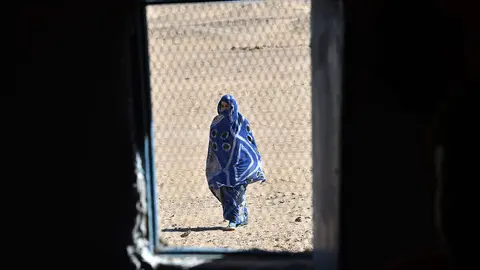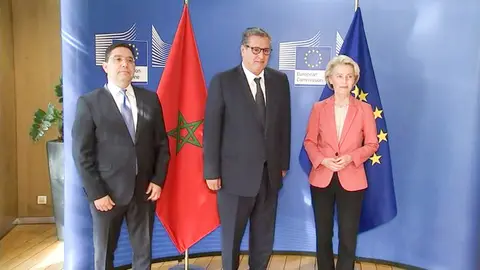The Popular Party and its position on Sahara: an anomalous opposition

"The PP will once again take the turnaround on the Sahara to Congress to revoke Sánchez's unilateral support for Morocco" or "Feijoo proposes a commission of enquiry in Congress on Sánchez's turnaround on the Sahara" are some of the most recent headlines. "The government has broken a 40-year consensus", Feijoo went so far as to say.
The reality is that, in the first instance, this change of position was not something of great concern within the party. In any case, it would seem that the PP did not object so much to the substance of the change of position on the Sahara as to the forms, on which there is broad consensus that they could have been clearly improved. But I do not think it is necessary at this point to explain that the importance and substance of this issue is infinitely more important than any "it is not what you say, but how you say it".
In fact, a few months later in July 2022, the Popular Party helped to cement the government's change of position on the Sahara by voting in Parliament against a motion tabled by the Basque and Catalan pro-independence movement aimed at reversing the government's new position. The result was 252 votes against, including those of the PP, 70 in favour and 11 abstentions. This vote was undoubtedly a tacit PP endorsement of the government's position and therefore also entailed its acceptance of the Moroccan autonomy plan.
But all this has changed over time. In March and May of this year, it was the PP itself that pushed through parliamentary motions similar to the aforementioned 2022 motion, only this time they changed sides. To widespread astonishment, they pushed them through with the support of Pedro Sánchez's investiture partners. They demanded that the government rectify its position on the Sahara. Seeing is believing.
What's more, the next chapter of this pantomime was staged yesterday with a third motion, in which the PP returns to this issue in the mouth of Rafael Hernando, criticising the "Copernican turn" regarding the Sahara and the motives behind it. In their non-legislative motion they demand, once again, an immediate return to the traditional position on the Sahara.
This is a strange alliance of the PP with parties it presumes to abhor, at the expense of a sufficiently serious issue that its interest in the question fluctuates to a greater or lesser extent at electoral convenience as if it were a weather vane. What is more, the Popular Party made no express mention in its electoral programme of a year ago, for the 2023 general elections, of a return to Spain's traditional position on the Sahara, which they now claim so much.
In this small chronology, 2023 could be the key date. A general election in which the PP (and almost all the polls) predicted they would emerge victorious, and whose outcome we all know. Suddenly, we went from a hypothetical PP government that never was, and which would surely have maintained excellent ties with Morocco by maintaining Sánchez's stance on the Sahara, to a frustrated stay in opposition. And from there, to the change to an opposition baptised as "hardline" with the appointment of Miguel Tellado as spokesman. "Feijoo reorganises the PP to make a tough opposition against Sánchez" or "Tellado advances a tough and forceful opposition" were some of the headlines we could read about what was to come.
It goes without saying that writing these lines does not imply on my part a gratuitous criticism made from an ideological trench. When I have criticised Spanish political leaders and parties on this issue, it has been on account of their blind and inflamed support for the Polisario Front, especially in relation to the use of Spanish taxpayers' public money for Tindouf, for which there will never be any accountability. Indeed, I have been especially critical of the PSOE when they have committed such blunders as those related to Brahim Ghali's opaque and illegal entry into Spain, which by the way are still going on today. But the PP's back-and-forth on a matter as thorny as this, which is a humanitarian tragedy that goes back several decades, reflects such frivolity and irresponsibility that I thought it appropriate to set them out in a separate, well-argued analysis.
Having made this point, it is clear that the hard-line opposition strategy in which the Partido Popular is immersed covers all kinds of issues without exception, including the Sahara. A strategy that on numerous occasions involves the adoption of tactics that seek to hinder or veto the implementation or establishment of certain policies by the government.
This type of opposition is not based on constructive criticism or viable alternative proposals - in the PP's electoral programme for the recent European elections, for example, there is not a single mention of the Sahara - it is simply a matter of harassing government action in order to erode it. Strong opposition may sometimes be justified, but in cases like this one, it is difficult to understand. Any means is used to a clear and concrete end. Here the means would be to change the government's position on the Sahara. And the end is to undermine the credibility of Sánchez's government.
This would fit, in political science terms, into what Giovanni Sartori would define in his typology of political opposition as "constitutional but not responsible opposition". This particular category respects the rules of the democratic game, but does not contribute constructively to the political process, prioritising blocking and criticism over dialogue and the search for solutions. This implies a purely reactive approach to the detriment of a proactive approach, where an effective and responsible opposition should be guided by a set of broader principles and objectives, and should be willing to collaborate and seek consensus on key issues with a certain level of vision.
One of the ways in which this strategy is conveyed is through a certain type of rhetoric, which emphasises confrontation and demonisation of the opponent. The use of terms such as "illegitimate government" or "betrayal of Spain" are examples of this exacerbated rhetoric, terms that are sometimes cloned bidirectionally from/towards the party further to the right. This type of oratory seeks to reinforce the public's perception that the government is acting contrary to national interests and democratic values, a tactic aimed at delegitimising the government and its decisions, in this case in foreign policy. This tense, conflictive and unbreathable political atmosphere hinders cooperation between Spain's two main political parties on specific issues - so necessary in an issue such as this - in a scenario of highly polarised multi-party competition.
On the other hand, the Popular Party has repeatedly questioned the legitimacy of Pedro Sánchez's government, accusing it of coming to power through alliances with parties they consider radical or contrary to Spain's unity, such as Catalan, Basque or extreme left-wing pro-independence parties. However, in relation to the Sahara, there is the paradox that it is the PP itself that aligns itself with these parties that, under normal conditions, would be considered its ideological adversaries.
On this point, the Popular Party incurs in several contradictions: the first is the paradox we have just mentioned. Moreover, by aligning itself with these parties and confronting the government by rejecting support for the Moroccan autonomy proposal, it is implicitly or indirectly supporting the Polisario Front. This leads to another contradiction, as this group maintains close links and collaboration with certain extreme left-wing regimes, such as those in Cuba and Venezuela. Incidentally, these regimes have been duly used against the government in parliament on numerous occasions as a weapon of war when necessary. But here, on tiptoe, they turn a blind eye and overlook it, which implies a double standard that undermines their credibility, due to the stubbornness of the Popular Party in maintaining a fraternal opposition against the Government on all kinds of items, without a minimum of prior filtering to analyse the particularities of each case.
Electioneering motives? They are always there, by definition an opposition must have them, but where is the limit? It is clear that the PP's criticism of Sánchez's government on this issue is motivated more by electoral considerations than by genuine conviction in its Sahara policy, if it ever existed. Not surprisingly, it is an issue that was never of particular interest within the party. But by presenting itself as advocating a different foreign policy towards Morocco, the PP has sought to capitalise on popular discontent by presenting itself as a responsible and patriotic alternative in full competition with other parties within its ideological arc.
Finally, we find yet another contradiction of the Popular Party, the most flagrant if possible. This is a simple verification of the political colour of the foreign governments that have so far officially supported the Moroccan autonomy proposal for the Sahara. Focusing mainly on the countries of the European Union, with the accession of Slovenia a few days ago, seventeen countries have now supported the proposal. But of those seventeen, no less than eleven have been governments ranging from the centre-right to the extreme right. From Merkel's Germany to Macron's France, via Meloni's Italy. Many of these parties share a parliamentary group in the European Parliament with the PP.
A massive and cross-cutting endorsement by EU countries of the proposal for Moroccan autonomy that does nothing more than follow the line taken year after year, in the same terms, by the United Nations Security Council in its successive resolutions, and to which the Popular Party seems to be alienated more by the desire to discredit the political adversary than by a consistent assessment of Spain's interests in foreign policy. This de facto non-alignment with the positions held by ideologically aligned governments highlights an obvious inconsistency in the PP's stance.
To close the chapter of contradictions on this issue, we should not forget the outcome of the two high-level meetings (RAN) that the Popular Party government, led by former president Mariano Rajoy, held with Morocco during his term of office in 2012 and 2015. The Sahara issue appears in the joint declarations of both meetings. There they defended 'a consensual and mutually acceptable political solution for the Sahara'. This is not very different from the current Spanish government's position, which Zapatero has been advocating since 2007. In fact, it is practically a carbon copy of what each country officially declares in their respective communiqués of support for Morocco on this issue. The only difference is that the term 'autonomy' was not used in those meetings with Rajoy at the helm.
So, at this point, is there still anyone who wonders whether the PP will change this "volantazo" when it comes to power in the future? Absolutely not. Some of those seventeen countries have subsequently changed governments, and their position on the Sahara has remained unchanged. If we go outside the EU, things do not change much. The most notorious example is the United States, where Biden did not change Trump's position on the issue.
To conclude, I would like to recall the statements of an authoritative voice on the matter, Hach Ahmed, president of the dissident Movement Saharawi for Peace, in a recent interview in this magazine. In response to a question about the PP's position on the Sahara, he replied that "it would be better if they stopped using this issue as a domestic political issue, swaying their opponents on account of their position, and tried to row in the same direction to help resolve this dispute. Almost half a century of conflict is more than enough".
In short, moving solely for electoral motives can lead to an opposition that prioritises constant criticism without solid foundations, polarisation and obstruction of policies that could be beneficial for the country. A mature and responsible opposition must balance its electoral objectives with a genuine commitment to the welfare of the country and the quality of democracy.
In the meantime, we are still waiting and searching. We are looking for a responsible opposition that knows how to discern which issues are above electoral calculations and has a sense of state for an issue of such importance and humanitarian drama, and at the same time does not hinder and joins in the search for consensual solutions to critical problems such as this one.
We are also looking for an opposition that has enough personality to stop hiding behind the word "volantazo" and not allow itself to be influenced by buying the ideological frameworks of the extreme right by waving the mantra of "fear of the Moor" for a handful of votes, or by buying those of the extreme left and pro-Polisario independence supporters by submitting to one of their historical demands. As mentioned earlier, half a century in the Sahara is too long, and pragmatism is calling the tune. Contrary to what many try to sell, swerves also prevent accidents and are not just Spain's doing. This is a clear example. And if not, take a look around the European Union, we have already made 17 swerves out of a possible 28. It goes on and on.
ANNEX
LIST OF EUROPEAN UNION COUNTRIES THAT HAVE SUPPORTED THE AUTONOMY PROPOSAL PRESENTED BY MOROCCO IN 2007, TOGETHER WITH THE DATE OF RECOGNITION, THE GOVERNMENT THAT MADE IT AND ITS POLITICAL SIGN:
1. France: *
o Date: April 2007
o Ideological orientation: Right-wing (presidency of Nicolas Sarkozy of the Union for a Popular Movement (UMP) party).
2. Germany:
o Date: December 2020
o Ideological orientation: centre-right (government of Angela Merkel of the Christian Democratic Union (CDU) party).
3. Hungary:
o Date: June 2021
o Ideological orientation: extreme right (Viktor Orbán's government of the Fidesz party).
4. Spain:
o Date: March 2022
o Ideological orientation: left-wing (Government of Pedro Sánchez of the Spanish Socialist Workers' Party, PSOE).
5. The Netherlands:
o Date: May 2022
o Ideological orientation: centre-right (Government of Mark Rutte of the People's Party for Freedom and Democracy, VVD).
6. Slovakia:
o Date: May 2022
o Ideological orientation: centre-right (Government of Eduard Heger of the OĽaNO party).
7. Cyprus:
o Date: May 2022
o Ideological orientation: centre-right (Government of Nicos Anastasiades of the DISY party).
8. Romania:
o Date: May 2022
o Ideological orientation: centre-right (Government of Nicolae Ciucă of the National Liberal Party, PNL).
9. Belgium:
o Date: October 2022
o Ideological orientation: centre-left (Government of Alexander De Croo of the Reform Movement party, MR).
10. Luxembourg:
o Date: October 2022
o Ideological orientation: centre-left (Government of Xavier Bettel of the Democratic Party, DP).
11. Austria:
o Date: February 2023
o Ideological orientation: centre-right (Government of Karl Nehammer of the Austrian People's Party, ÖVP).
12. Portugal:
o Date: May 2023
o Ideological orientation: centre-left (Government of António Costa of the Socialist Party).
13. Malta:
o Date: June 2023
o Ideological orientation: centre-left (Government of Robert Abela of the Malta Labour Party, Labour Party).
14. Italy:
o Date: July 2023
o Ideological orientation: extreme right (coalition government of Giorgia Meloni).
15. Czech Republic:
o Date: October 2023
o Ideological orientation: centre-right (Government of Petr Fiala of the Civic Democratic Party, ODS).
16. Bulgaria:
o Date: January 2024
o Ideological orientation: centre-right (Nikolai Denkov, Citizens' Party for European Development of Bulgaria, GERB).
17. Slovenia:
o Date: June 2024
o Ideological orientation: centre-left (Robert Golob, Movement for Freedom)
* While France's recognition of Morocco's autonomy proposal for the Sahara has only recently settled with the government of Emmanuel Macron, it was Nicolas Sarkozy who was the first to speak out in office, declaring that 'the autonomy plan is a basis for negotiation in the search for a reasonable agreement', adding that he took this issue as 'his responsibility as head of state'.



